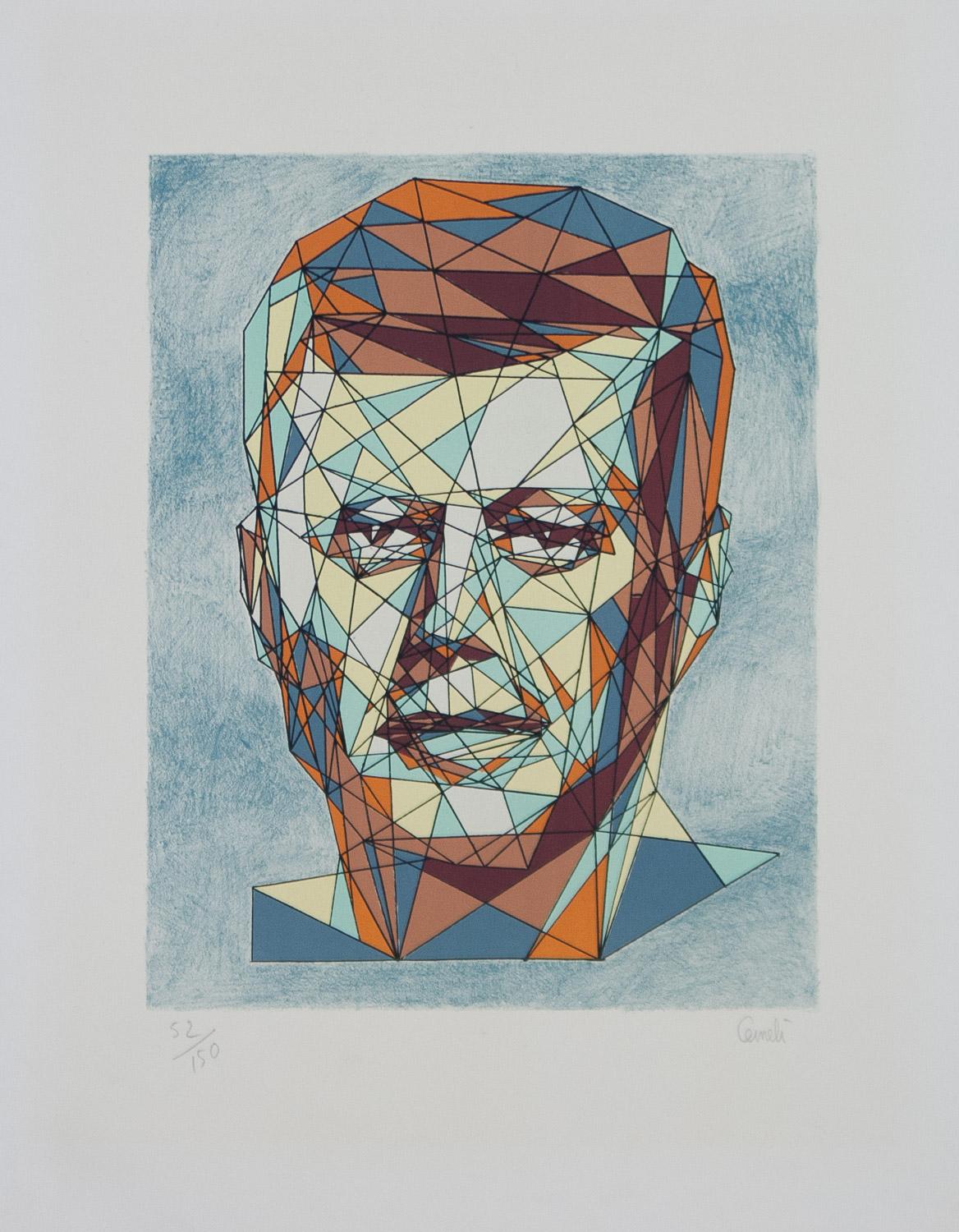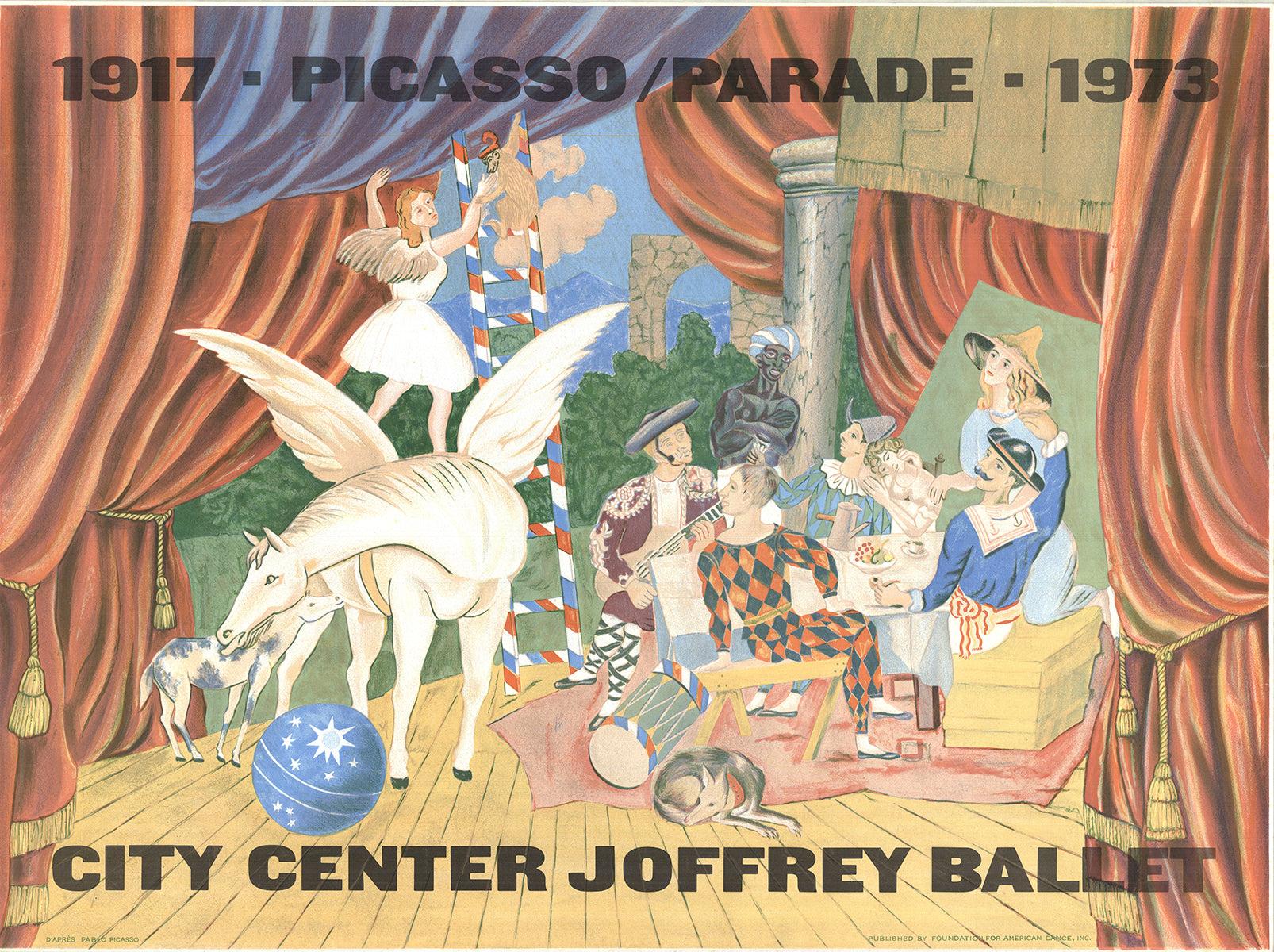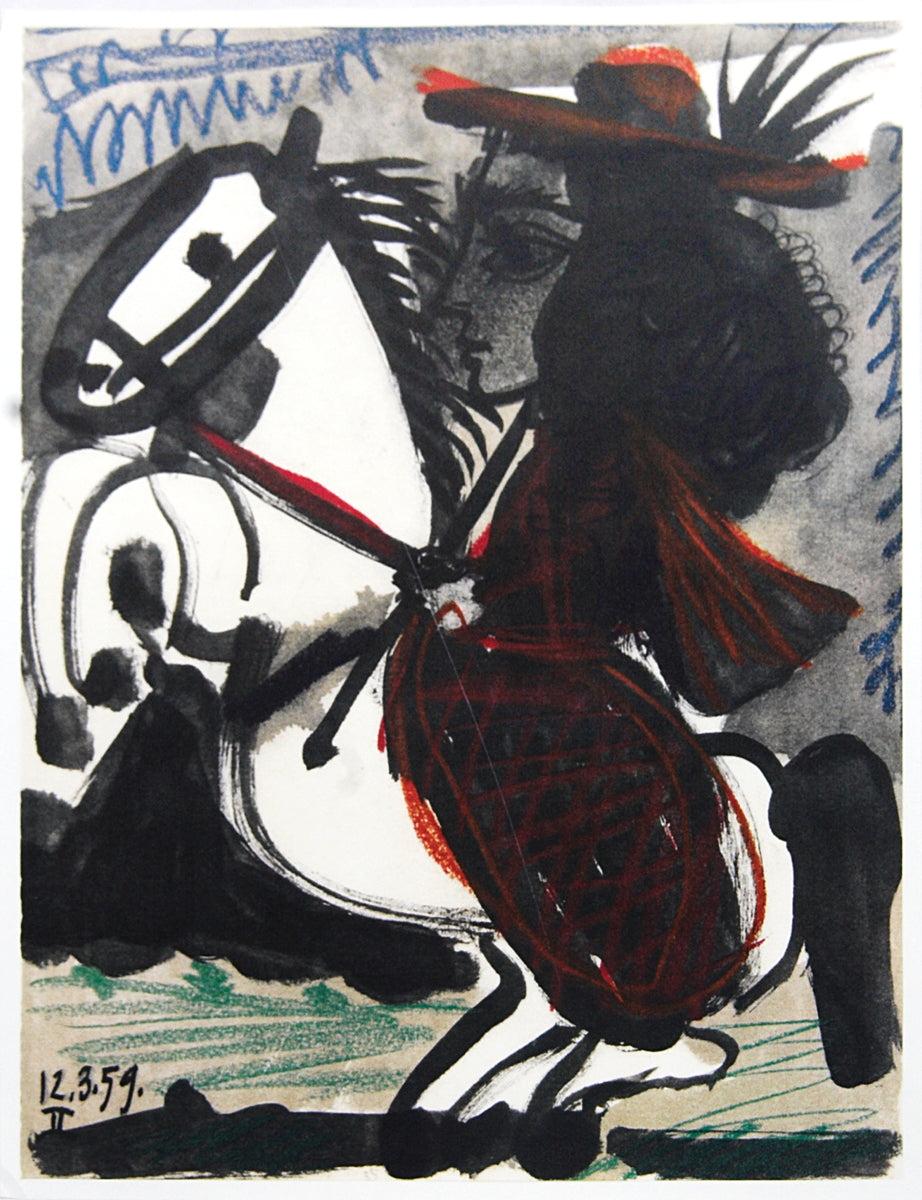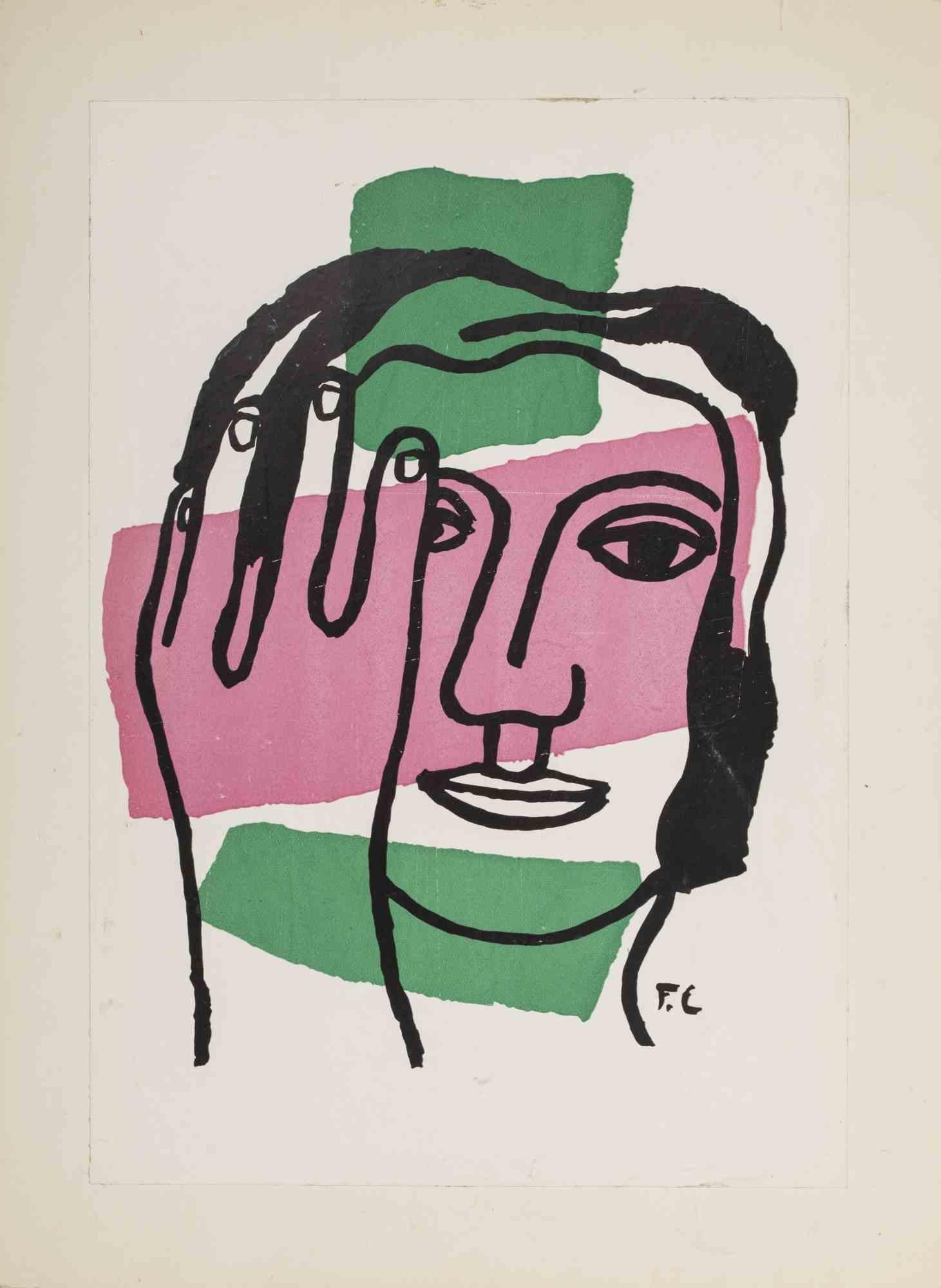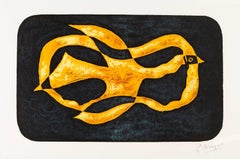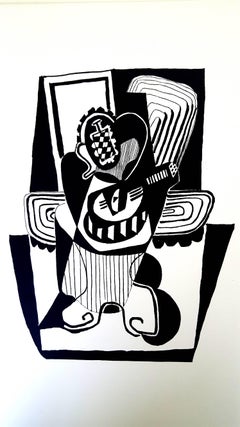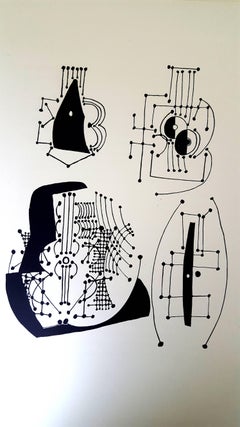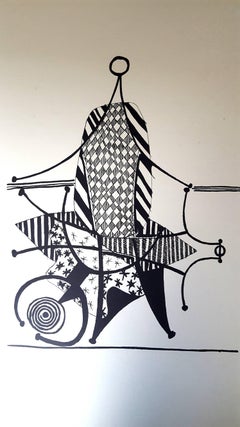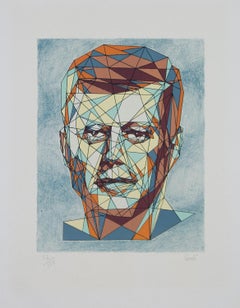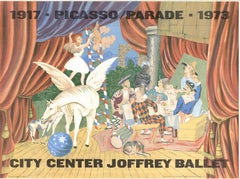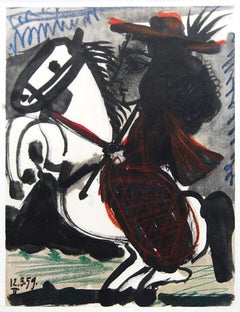Items Similar to "A Poem in Each Book" Exhibition Poster
Want more images or videos?
Request additional images or videos from the seller
1 of 7
"A Poem in Each Book" Exhibition Poster1956
1956
About the Item
Exhibition poster for "A Poem in Each Book" by Paul Eluard, illustrated by his friends the painters-engravers, at Maison de la Pensée Française, Paris, October 26 - November 11, 1956
Published by Louis Broder
1000 impressions
Unsigned
Dimensions: 50 x 32.5 cm
Reference: Czwiklitzer 109
- Creation Year:1956
- Dimensions:Height: 19.69 in (50 cm)Width: 12.8 in (32.5 cm)Depth: 0.04 in (1 mm)
- Medium:
- Movement & Style:
- After:Pablo Picasso (1881-1973, Spanish)
- Period:
- Condition:
- Gallery Location:Collonge Bellerive, Geneve, CH
- Reference Number:1stDibs: LU16129469292
About the Seller
4.9
Gold Seller
Premium sellers maintaining a 4.3+ rating and 24-hour response times
Established in 2015
1stDibs seller since 2015
953 sales on 1stDibs
Typical response time: <1 hour
- ShippingRetrieving quote...Shipping from: Collonge Bellerive, Geneve, Switzerland
- Return Policy
Authenticity Guarantee
In the unlikely event there’s an issue with an item’s authenticity, contact us within 1 year for a full refund. DetailsMoney-Back Guarantee
If your item is not as described, is damaged in transit, or does not arrive, contact us within 7 days for a full refund. Details24-Hour Cancellation
You have a 24-hour grace period in which to reconsider your purchase, with no questions asked.Vetted Professional Sellers
Our world-class sellers must adhere to strict standards for service and quality, maintaining the integrity of our listings.Price-Match Guarantee
If you find that a seller listed the same item for a lower price elsewhere, we’ll match it.Trusted Global Delivery
Our best-in-class carrier network provides specialized shipping options worldwide, including custom delivery.More From This Seller
View AllAfter Georges Braque - Antiborée - Lithograph
Located in Collonge Bellerive, Geneve, CH
Lithograph after Georges Braque.
Signed in the plate
Edition of 150
Dimensions: 76 x 117 cm
Bibliography:
« Les Métamorphoses de Braque» of Heger de Loewenfeld and Raphaël de Cuttoli , Editions FAC, Paris, 1989.
In 1961 Georges Braque decided with his laidary friend Heger de Loewenfeld to pick up certain of his works to in order to create artworks, this beautiful litograph is one of them.
Héméra in the Mythology:
In Greek mythology Hemera was the personification of day and one of the Greek primordial deities. She is the goddess of the daytime and, according to Hesiod, the daughter of Erebus and Nyx (the goddess of night). Hemera is remarked upon in Cicero's De Natura Deorum, where it is logically determined that Dies (Hemera) must be a god, if Uranus is a god. The poet Bacchylides states that Nyx and Chronos are the parents, but Hyginus in his preface to the Fabulae mentions Chaos as the mother/father and Nyx as her sister.
She was the female counterpart of her brother and consort, Aether (Light), but neither of them figured actively in myth or cult. Hyginus lists their children as Uranus, Gaia, and Thalassa (the primordial sea goddess), while Hesiod only lists Thalassa as their child.
The father of Cubism
Three Cubist that distinguishes art historian periods were initiated and developed by Georges Braque: The Cubist Cézanne (1907-1909), Executive (1909-1912) and synthetic (1912-1922).
Post-Impressionist and fawn, Braque no longer adheres to the contingency of a decorative way or the other. Cézanne’s paintings exhibited at the Grand Palais during the retrospective of 1907 are a revelation: Cézanne sought and invented a pictorial language. In his footsteps, Braque went to the South with the reasons of the Master. He returned with Estaque landscapes and surprising Ciotat it keeps Cezanne geometric model and retains the “passages” continuity from one surface to another to create the sensation of “turning around” of the object represented. But he wants to go after the consequences of the vision of Cezanne. In his paintings Houses in L’Estaque (1908) it simplifies the volumes of houses, neglects detail by removing doors and windows: the plastic rhythm that builds the table. Large Nude , a masterpiece of the period, can be considered the first work of Cézanne cubism .
Systematizing and deepening Braque discoveries open the door analytical cubism. In 1909, his painting became more cerebral than sensual. The pattern is recreated in the two-dimensionality of the canvas, leaving aside any illusionistic perspective. In Still Life with Violin, objects are analyzed facets according to their characteristic elements, each facet referring to a particular view of the object. There are so many facets of points selected view: Table reflects the knowledge of the object and the ubiquity of the eye. Moreover, Braque is looking for the essence of the objects in the world rather than their contingency, which explains the absence of light source and use of muted colors (gray, ocher), contingent aspects of the object . But formal logic has stepped facets, erased any anecdote to the object and ultimately led to his painting a hermetic more marked on the edge of abstraction (see the series of Castle Roche-Guyon ).
Braque, anxious to keep the concrete and refusing at all costs that the logic of Cubism takes the paintings to abstract, reintroduced signs of reality in his paintings in 1912 marks the beginning of Synthetic Cubism. Historians speak of “signs of real” rather than reality because what interests Braque, this is not to put reality into a table, but to create a painting which, by its language, refers to the real. To do this, he invented two major techniques XX th century inclusions and contributions. The inclusions consist of painting objects that have no real depth, materials (wallpaper in Nature morte aux playing cards faux wood is a pictorial inclusion) or letters (calligraphic inclusion in Portuguese ), made first brush and a few months later stencil. Contributions are defined in contrast with the collage on canvas of foreign materials: glued or sand paper, sawdust, etc.. Regarding the collages, Braque used for the first time in September 1912 a piece of adhesive paper imitating faux wood Compote...
Category
1950s Cubist Animal Prints
Materials
Lithograph
Pablo Picasso (after) Helene Chez Archimede - Wood Engraving
By (after) Pablo Picasso
Located in Collonge Bellerive, Geneve, CH
Pablo Picasso (after)
Helene Chez Archimede
Medium: engraved on wood by Georges Aubert
Dimensions: 44 x 33 cm
Portfolio: Helen Chez Archimede
Year: 1955
Edition: 240 (Here it is on...
Category
1950s Cubist Figurative Prints
Materials
Lithograph
$734 Sale Price
20% Off
Pablo Picasso (after) Helene Chez Archimede - Wood Engraving
By (after) Pablo Picasso
Located in Collonge Bellerive, Geneve, CH
Pablo Picasso (after)
Helene Chez Archimede
Medium: engraved on wood by Georges Aubert
Dimensions: 44 x 33 cm
Portfolio: Helen Chez Archimede
Year: 1955
Edition: 240 (Here it is on...
Category
1950s Cubist Figurative Prints
Materials
Engraving, Woodcut
$734 Sale Price
20% Off
Pablo Picasso (after) Helene Chez Archimede - Wood Engraving
By (after) Pablo Picasso
Located in Collonge Bellerive, Geneve, CH
Pablo Picasso (after)
Helene Chez Archimede
Medium: engraved on wood by Georges Aubert
Dimensions: 44 x 33 cm
Portfolio: Helen Chez Archimede
Year: 1955
Edition: 240 (Here it is on...
Category
1950s Cubist Figurative Prints
Materials
Engraving
$918 Sale Price
20% Off
Pablo Picasso (after) Helene Chez Archimede - Wood Engraving
By (after) Pablo Picasso
Located in Collonge Bellerive, Geneve, CH
Pablo Picasso (after)
Helene Chez Archimede
Medium: engraved on wood by Georges Aubert
Dimensions: 44 x 33 cm
Portfolio: Helen Chez Archimede
Year: 1955
Edition: 240 (Here it is on...
Category
1950s Cubist Figurative Prints
Materials
Engraving, Woodcut
$1,009 Sale Price
20% Off
Pablo Picasso (after) Helene Chez Archimede - Wood Engraving
By (after) Pablo Picasso
Located in Collonge Bellerive, Geneve, CH
Pablo Picasso (after)
Helene Chez Archimede
Medium: engraved on wood by Georges Aubert
Dimensions: 44 x 33 cm
Portfolio: Helen Chez Archimede
Year: 1955
Edition: 240 (Here it is on...
Category
1950s Cubist Figurative Prints
Materials
Engraving
$1,009 Sale Price
20% Off
You May Also Like
Le Vieux Roi
By Pablo Picasso
Located in San Francisco, CA
This artwork titled "Le Vieux Roi" 1959 is an original Lithograph on Arches paper with Mourlot watermark. by Spanish artist Pablo Picasso, 1881-1973. It is stamp signed in red ink a...
Category
Mid-20th Century Cubist Figurative Prints
Materials
Lithograph
Portrait of John F. Kennedy
Located in Paonia, CO
Portrait of Kennedy by Cemeli is an original lithograph, limited edition number 52 out of 150 and pencil signed by the artist. Kennedy is portrayed as a sculptured multi-colored hea...
Category
1960s Cubist Portrait Prints
Materials
Lithograph
$750 Sale Price
21% Off
Stage set for Parade
By (after) Pablo Picasso
Located in Brooklyn, NY
Poster for The Joffrey Ballet's presentation of Parade with Costume designs by Picasso. Originally performed by the Ballet Russe with Sergei Diaghilev directing music by Eric Satie a...
Category
1970s Cubist Figurative Prints
Materials
Lithograph
Cavalier
By Pablo Picasso
Located in Brooklyn, NY
Cavalier is a reproduction of Picasso’s artwork depicting a horseman on horseback, originally created in 1954. This piece is featured in the publication Toros y Toreros, which includ...
Category
1950s Cubist Figurative Prints
Materials
Lithograph
$450
Man and Shadow - Original Lithograph (Morance 1938)
By Le Corbusier
Located in Paris, IDF
Le Corbusier (1887-1965)
Man and Shadow, 1938
Original lithograph
Signature printed in the plate
Dated in the plate
On light vellum 21 x 27 cm (c. 8 x 11 inch)
Very good condition,...
Category
1930s Cubist Figurative Prints
Materials
Lithograph
Tete de Femme - Lithograph after Fernand Léger - 1953
By Fernand Léger
Located in Roma, IT
Tete de Femme is a splendid lithograph realized by Fernand Leger in mid-20th Century.
Monogrammed on the lower left.
Very Good Condition.
Category
1950s Cubist Figurative Prints
Materials
Lithograph
